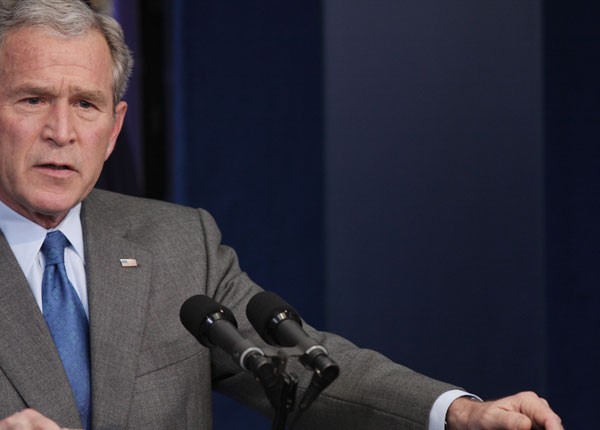NSA Revelations Spark Push to Restore FISA
Once thought to be a longshot, movement to reinstate FISA provisions picks up momentum.
Author:Raven NoirReviewer:Morgan MaverickJul 31, 20202.2K Shares38.5K Views
Former President George W. Bush (WDCpix)
In 2007 and 2008, as the Democratic-led Congress and the Bush administration collaborated in rewriting several elements of the Foreign Intelligence Surveillance Act, civil libertarians in and outside of Congress warned that the changes would institutionalize wide-ranging surveillance by the National Security Agency on U.S. citizens. In the wake of the revelations that the NSA “overcollected” domestic communications even beyond the boundaries of the 2008 FISA Amendments Act, many are claiming vindication — and vowing to lead an effort, once thought to be a longshot, to restore old FISA protections.
“It was a classic I-told-you-so moment,” said Caroline Fredrickson, the Washington director of the ACLU. “So many protections in FISA were dismantled by the FISA Amendments Act. We predicted this would happen.”
Illustration by: Matt Mahurin
The New York Times reportedWednesday night that the NSA acknowledged to Congress that it had engaged what it called an “overcollection” of communications — which the paper called “significant and systemic” — belonging to U.S. citizens without connection to terrorism. The Justice Department said in a statement that it had taken “comprehensive steps to correct the situation and bring the program into compliance” with the law, but did not specify how the law was broken; what measures were necessary to return the surveillance program to legality; nor what safeguards it enacted to prevent what the NSA is calling unintentional “overcollection” of domestic communications in the future. Attorney General Eric Holder has reauthorized the NSA surveillance program, the paper reported.
Civil liberties groups are currently reviewing their options for rolling back changes to the FISA law undertaken last year that established what they say is a permissive legal framework for the disclosed abuse, and they see the new administration as an ally, even despite recent policy decisions that have disappointed civil libertarians. “I don’t know if I’ve seen anything that would lead me to think Holder is unwilling to revisit the rules,” Fredrickson said.
After The New York Times disclosed in 2005 that the Bush administration ordered the NSA to engage in warrantless surveillance of communications that included the phone calls and emails of U.S. citizens as part of its response to the 9/11 terrorist attacks, the administration and Congress in 2007 sought to change the standards for seeking a warrant from the Foreign Intelligence Surveillance Court established by the FISA law of 1978.
Several rounds of heated negotiations led to the emergence and passage, in July 2008, of a bill that allowed the NSA to seek a generalized warrant from the court to allow surveillance on intelligence “targets” as long as the agency “reasonably” believed one party to a communication to be outside the United States at the time of surveillance. It did not require the agency to submit to the court a finding of individualized suspicion indicating that a specific surveillance target was reasonably believed to pose a threat to national security. The law established a biannual review process, conducted jointly by the Attorney General and the Director of National Intelligence, to ensure that the process fell within those loosened restrictions, which civil libertarians warned were ripe for abuse.
Then-Sen. Barack Obama voted for the bill.
“We were right,” said Kate Martin, director of the Center for National Security Studies, one of the principal groups pushing against the FISA Amendments Act’s abandonment of individualized suspicion. In passing the FISA Amendments Act last year, she said, then-President Bush and then-Director of National Intelligence Michael McConnell “refused to explain or even mention what kinds of powers they really gave the NSA, in particular with regard to call and email record data. We continually tried to say, ‘hey, this authorizes a massive collection of meta-data” — a term referring to non-substantive information about the origin of communications, such as the Internet Protocol addresses from which emails originate, but not the substance of a communication — “with no safeguards on Americans.’”
By contrast, during the 2008 debate over the FISA Amendments Act, Sen. Orrin Hatch (R-Utah) saidthat civil libertarian concerns about excessive domestic surveillance “only feeds the delusions of those who wear tinfoil hats around the house and think that 9/11 was an inside job.”
The reaction to the news of the NSA “overcollection” prompted quick congressional outcry and promises to revisit the 2008 law, something that for the past year civil libertarians have acknowledged was an uphill battle.
On Thursday morning, Sen. Dianne Feinstein (D-Calif.), the chairwoman of the Senate Select Committee on Intelligence, vowed an investigation of the extralegal NSA surveillance. Sen. Russ Feingold (D-Wisc.), a key congressional ally of civil libertarians and a member of both the Senate’s intelligence and judiciary communities, said that “Congress must get to work fixing these laws that have eroded the privacy and civil liberties of law-abiding citizens.”
The ACLU, which sued the government in July 2008 to challenge the constitutionality of the FISA Amendments Act, reiterated its call for a special congressional committee to investigate Bush-era intelligence abuses. Fredrickson said the organization would pressure Congress to revisit the law alongside a scheduled review of the Patriot Act, which has provisions set to expire this year. Sen. Harry Reid (D-Nev.), the Democratic Senate leader, voted against the FISA Amendments Act, and saidlast year that the 2009 Patriot Act reauthorization debate “may provide a suitable occasion to review the related issues in this FISA bill.”
Fredrickson said she hoped Reid would hold to his statement “now we that we know the [FISA Amendments Act] dismantled civil liberties protections,” but she added that without a thorough congressional review of the scope of illegal surveillance, Congress would “keep nitpicking and not get at the real problem, which is a set of incoherent and unspecific provisions that give law enforcement and the National Security Agency access to information” on Americans’ communication without adequate safeguards.
Reid’s office did not return requests for comment.
Martin added that a necessary first step was to get the Holder Justice Department to specify what powers it believes the FISA Amendments Act gives it. “Before you even get to the question of what they’re doing, it’s the most fundamental tenet of democracy that the people are entitled to know what the law is — what powers the government has to collect information on their private communications,” she said. The New York Times’ story “demonstrates there’s some secret internal back-and-forth involving, at least, the Justice Department, the NSA and the FISA Court, and maybe Congress, about what powers they have or don’t have. It’s as undemocratic as can be. We need to be a part of that debate.”
While the Holder Justice Department has taken several positions that have angered civil libertarians, including the invocation of the “state secrets” privilegeto urge a federal court to dismiss a lawsuit brought by AT&T customers who believe they were illegally surveilled, it includes several key officials who have expressed alarm over wideranging surveillance during the Bush administration. David Kris, a former general counsel to Time-Warner, wrote an extensive memo in January 2006 claiming the foundations for the Bush administration’s warrantless surveillance programs — programs that spurred and formed the basis for the FISA Amendments Act — were seriously flawed. Kris is now in charge of the Justice Department’s national security division. His analysis was calleda “thorough debunking” by Marty Lederman, now the deputy chief of the department’s Office of Legal Counsel.
Staffers for Feingold referenced an exchange between Feingold and Kris at Kris’ February 25 confirmation hearing, in which Feingold obliquely referred to “specific concerns I have about how the FISA Amendments Act has been implemented.” Kris replied that “You increased my desire to, if I were to be confirmed, to get to the bottom of the FISA Amendments Act… to see how best to make any necessary improvements.”
“We want the law revisited,” Martin said, “but we only want it revisited when there’s been sufficient public disclosure to have meaningful debate. That will include meaningful public disclosure about the past programs.”

Raven Noir
Author
Raven Noir is a captivating and enigmatic news reporter who unravels mysteries with a relentless pursuit of truth. Possessing an insatiable curiosity and an astute mind, Raven delves into the depths of complex stories, unearthing secrets that lie beneath the surface. With a masterful grasp of deduction and observation, Raven stands as a beacon of fearless investigation.
In the realm of journalism, Raven is known for his enigmatic presence, drawing people in with an aura of intrigue. Driven by an unwavering passion for unveiling the truth, Raven Noir continues to shed light on the darkest corners of society. Through captivating storytelling and unwavering determination, he challenges conventions and uncovers enigmatic secrets that lie just beyond the surface.

Morgan Maverick
Reviewer
Morgan Maverick is an unorthodox news reporter driven by an insatiable hunger for the truth. Fearless and unconventional, he uncovers hidden narratives that lie beneath the surface, transforming each news piece into a masterpiece of gritty authenticity. With a dedication that goes beyond the boundaries of conventional journalism, Morgan fearlessly explores the fringes of society, giving voice to the marginalized and shedding light on the darkest corners.
His raw and unfiltered reporting style challenges established norms, capturing the essence of humanity in its rawest form. Morgan Maverick stands as a beacon of truth, fearlessly pushing boundaries and inspiring others to question, dig deeper, and recognize the transformative power of journalism.
Latest Articles
Popular Articles

